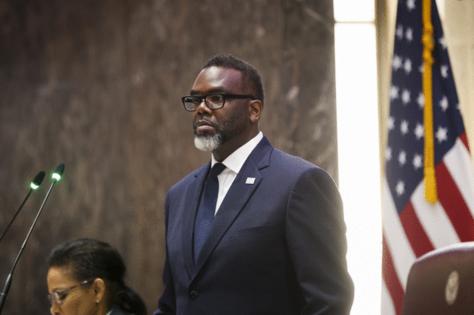Optimism, doubt ahead of Chicago mayor's Treatment Not Trauma mental health plan
Published in Health & Fitness
Belmont Cragin residents were filing into the cafeteria at Prieto Math and Science Academy last month to weigh in on Mayor Brandon Johnson’s signature plan to overhaul Chicago’s mental health system when they got unexpected evidence that the bold, still largely theoretical plan remains a focus at City Hall.
Into the school walked Johnson, an unannounced guest at the community forum, surrounded by a flock of leading administration officials.
“It’s one of our top priorities,” he told attendees, before talking about his older brother, Leon, who dealt with untreated mental illness and died addicted and unhoused. “Our ultimate goal, our primary goal, is that we provide mental health services without barriers. That when, where and however individuals and families need these services, the city of Chicago shows up.”
Despite the mayor’s words, however, the actual progress on his campaign promise to install the so-called Treatment Not Trauma plan remains difficult for Chicagoans to see. The City Council tasked a working group with answering many of the toughest implementation questions: where to open facilities, what to ask for in the budget, how many people to hire and more. Beyond that, few changes have materialized.
But the path forward should soon become clearer: A year into Johnson’s first term, the working group’s report outlining the plan’s future will be published later this month. For the coalition of activists who have spent a decade pushing for the policy and dogging mayors to enact it, the city’s report should finally prove whether or not Johnson is truly offering a different path for mental health care in Chicago.
The people working to implement Treatment Not Trauma remain optimistic about the potentially sweeping policy’s future. But some of its proponents looking in from outside the bureaucratic process worry the long-awaited proposals are moving too slowly and will not live up to the bold vision championed by years of community organizing.
Johnson quickly passed an ordinance to launch the city’s working group once in office, but to move forward, the policy needs “active leadership” from City Hall, not “infinite working groups, infinite consensus buildings and no movement,” said Eric Reinhart, a public health, law and psychiatry anthropologist and physician who co-drafted the “white paper” report published by the activist coalition that pushed for the policy.
“I think it’s quite disappointing to all of us that a year into this administration, that even on the campaign stage held up Treatment Not Trauma as one of its core priorities, we still haven’t made any steps forward,” he said. “Everybody’s getting a working group, but where are we seeing implementation?”
But Reinhart’s white paper co-author, Arturo Carrillo, expressed optimism after the Prieto Academy event. A member of the working group preparing the policy’s path forward, Carrillo is also a social worker who directs violence prevention and health initiatives for the Brighton Park Neighborhood Council, part of the broad Treatment Not Trauma coalition.
“It’s almost like we are playing catch up,” Carrillo said. “This should have been started four years ago. Under the last administration. We were constantly being told no, we were constantly seeing barriers put up. Complete resistance to any input. Now we absolutely see the wheels of government moving.”
...continued
©2024 Chicago Tribune. Visit at chicagotribune.com. Distributed by Tribune Content Agency, LLC.







Comments